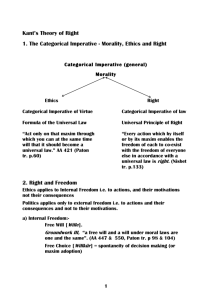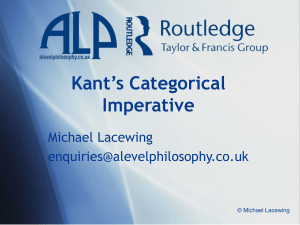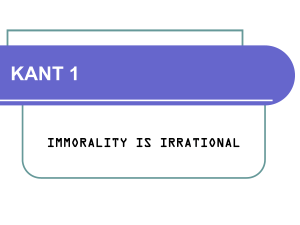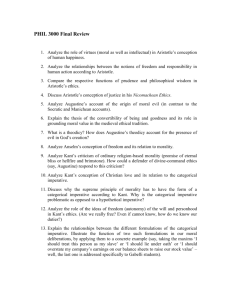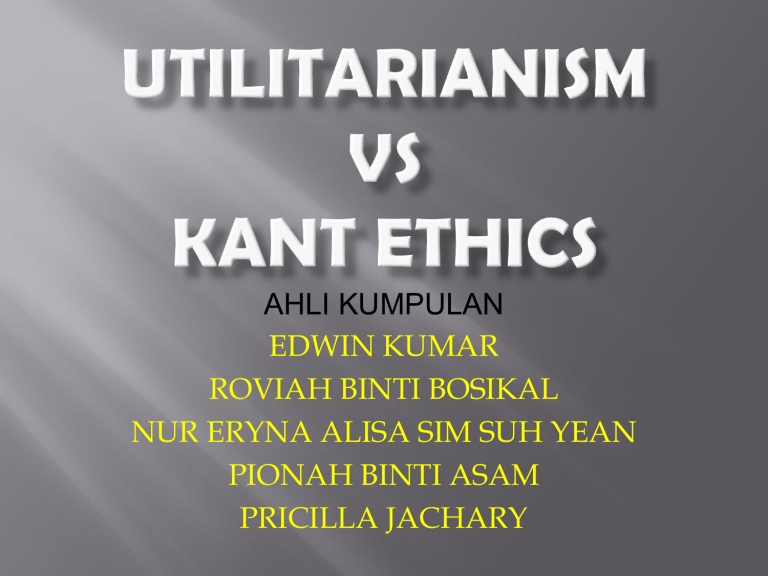
AHLI KUMPULAN
EDWIN KUMAR
ROVIAH BINTI BOSIKAL
NUR ERYNA ALISA SIM SUH YEAN
PIONAH BINTI ASAM
PRICILLA JACHARY
UTILITARIANISM FOUNDER JEREMY BENTHAM WAS AN
ENGLISH PHILOSOPHER.
MORAL THEORY THAT FOCUS ON THE RESULTS, OR
CONSEQUENCES, OF OUR ACTIONS, AND TREATS INTENTIONS
AS IRRELEVANT.
UTILITARIANS AGREE THAT MORAL THEORY SHOULD APPLY
EQUALLY TO EVERYONE.
UTILITARIANISM IS A HEDONISTIC MORAL THEORY.
(MEANS THE GOOD IS EQUAL TO THE PLEASANT)
UTILITARIANISM IS OTHER – REGARDING.
(MEANS WE PERSUE HAPPINESS NOT ONLY FOR US BUT FOR AS
MANY PEOPLE AS POSSIBLE)
UTILITARIANIS SACRIFICE THEIR OWN GOOD FOR PLEASE
OTHERS
People desire happiness.
If people desire something other than happiness, it is because they believe it leads to happiness.
Therefore, happiness is the only thing that is desired for its own sake.
Something is desirable it is desired for its own sake.
Happiness is the only desirable thing.
Something is good it is desirable.
Happiness is the only good.
The total amount of happiness among persons is the total good.
The principle of utility
Actions are morally praiseworthy if they promote the greatest human welfare, and blameworthy if they do not.
Theses of Utilitarianism
Consequentialism: The rightness of actions is determined solely by their consequences.
Hedonism: Utility is the degree to which an act produces pleasure. Hedonism is the thesis that pleasure or happiness is the good that we seek and that we should seek.
Maximalism: A right action produce the greatest good consequences and the least bad.
Universalism: The consequences to be considered are those of everyone affected, and everyone equally.
ACT: argues that we should always choose our actions based on what will cause the greatest amount of happiness.
(Jeremy Bentham)
RULE: argues that we should figure out what sort of behavior usually causes happiness, and turn it into a set of rules.(
John Stuart Mill)
We Can’t Predict The Future
If you are judging your actions based on the outcome, then there is no way to make an accurate judgment. It is extremely difficult to correctly determine what the exact consequences of your actions will be. This makes the ideals behind utilitarianism a mute point.
Who Decides Good and Bad?
Who exactly is the say what is good and what is bad? Everyone is wired differently, and has different beliefs on these things. Some people believe that alcohol brings happiness, while others disagree and believe that it is poison. Who is right? When so much of morality is left up to judgment, issues will inevitably arise.
Favoritism Is Natural
How can someone make a utilitarian decision if their own loved ones are on the line? This is not possible, because your instincts will take over and you will make the decision that is in the favor of those you love.
KANT’S ETHIC THEORY
Kant’s theory is an example of a deontological moral theory –according to these theories, the rightness or wrongness of actions does not depend on their consequences but on whether they fulfill our duty.
Founder of Kant’s Ethics is a German philosopher Immanuel Kant
(1724-1804)
Deontological ethics is often seen as the opposite of consequentialist ethics.
Where the consequentialist is concerned with the outcome of the action, the deontologist is concerned with the nature of the action itself (more specially, the rule/law/reason/maxim for which an action was taken).
For the deontologist, some actions like murder are just inherently wrong, no matter the ultimate result.
Kant believed that there was a supreme principle of morality, and he referred to it as The Categorical Imperative .
The categorical imperative determines what our moral duties are.
What is an imperative?
An imperative is a command. So, "Pay your taxes!" is an imperative, as are "Stop kicking me!" and "Don't kill animals!“
Hypothetical Imperatives : these imperatives command conditionally on your having a relevant desire. E.g. “If you want to go to medical school, study biology in college.” If you don’t want to go to medical school, this command doesn’t apply to you. Another example, your father says, "if you are hungry, then go eat something!" - if you aren't hungry, then you are free to ignore the command.
Categorical Imperatives : These command unconditionally. E.g. “Don’t cheat on your taxes.” Even if you want to cheat and doing so would serve your interests, you may not cheat.
What is the connection between morality and categorical imperatives?
* Morality must be based on the categorical imperative because morality is such that you are commanded by it, and is such that you cannot opt out of it or claim that it does not apply to you.
How does the categorical imperative work?
First formulation (The Formula of Universal Law): "Act only on that
maxim through which you can at the same time will that it should become a universal law [of nature ].“
What is a maxim? A maxim is the rule or principle on which you act. For example, I might make it my maxim to give at least as much to charity each year as I spend on eating out, or I might make it my maxim only to do what will benefit some member of my family.
Basic idea: The command states, crudely, that you are not allowed to do anything yourself that you would not be willing to allow everyone else to do as well. You are not allowed to make exceptions for yourself. For example, if you expect other people to keep their promises, then you are obligated to keep your own promises.
Critism of Kantian Ethics
Kant's theory is abstract and not always easily appliable - it tells you what type of actions are good but not the right thing to do in particular situations
Some philosophers believe that Kants being in favour of freedom and saying that moral agents must obey the principles given in the Categorical imperative contradict each other. I am free as long as I obey these laws?
It is human nature to consider the consequences before acting
People are different and don't necessarily have the same sense of 'good will'
DIFFERENTIATION BY
DEFINITION
EXPLANATION
UTILITARINISM KANT’S ETHIC
An ethical view that can help an individual in making decisions
Kantianism that offers ethical guidelines that help people in making ethical decisions.
Judges the moral value of an action based on its outcome
Says all moral judgment on the nature of the action; the consequences are entirely irrelevant
CRITISM Does not let the rightness or wrongness of an action be affected by the kind of person who performs the action
Kantian ethics provides no specific information about what people should do because Kant's moral law is solely a principle of non-contradiction
EXAMPLE Curing five patients by five antibiotic for each than saving one patient who needs all
If a person wants to stop being thirsty, it is imperative that they have a drink.
